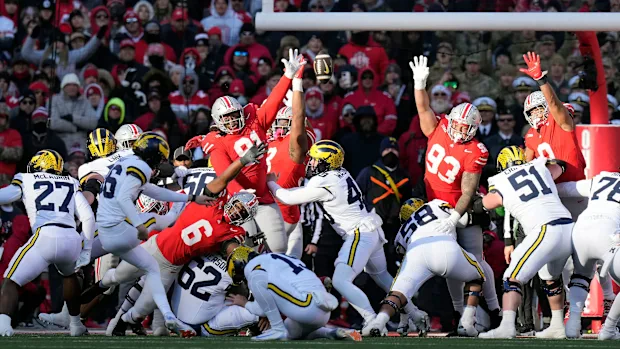Michigan defensive end Derrick Moore dismissed Ohio State’s national championship hopes, saying the Buckeyes’ loss to the Wolverines disqualifies their title claim. “It’s not a real win,” Moore said, implying that any path to a national title that goes through a loss to Michigan lacks legitimacy in his eyes.
Michigan defensive end Derrick Moore didn’t hold back when discussing Ohio State’s national championship hopes. In a pointed statement that’s already generating waves across the college football world, Moore made it clear he believes the Buckeyes’ path to glory was hollow. “It’s not a real win,” he said bluntly, referencing Ohio State’s loss to Michigan and asserting that any national title that doesn’t include a win over the Wolverines isn’t legitimate. His words underscore the intensity of college football’s fiercest rivalry and add fuel to a fire that never seems to cool.
Moore’s comments come in the wake of a season in which Ohio State, despite falling to Michigan in their annual showdown, still managed to put together an impressive enough resume to contend for a national championship. To Moore and many in Ann Arbor, however, that loss should’ve meant more than just a blemish on Ohio State’s record. It should’ve disqualified the Buckeyes from any serious claim to the sport’s highest honor. From the Wolverines’ perspective, beating Ohio State is more than a bragging right — it’s a measure of dominance, a line in the sand that separates contenders from pretenders.
“Look, you can’t call yourself champions if you couldn’t even beat your biggest rival,” Moore said. “That game means everything. It’s the biggest test, and if you fail that, you shouldn’t be holding up any trophy.”
His words struck a chord with fans on both sides. For Michigan supporters, Moore’s stance is a validation of their team’s superiority in recent years. The Wolverines have flipped the narrative after years of being dominated by Ohio State, and Moore’s comments reflect a confidence that hasn’t always existed in Ann Arbor. They see themselves not only as the superior team in the rivalry but as the rightful gatekeepers of Big Ten and national glory.
For Ohio State fans, though, Moore’s take is an affront. The Buckeyes’ faithful have long prided themselves on national relevance and consistent excellence, even when the rivalry doesn’t go their way. They argue that the College Football Playoff is designed to crown the best team over an entire season — not just one game. According to them, while The Game is massive, it isn’t the sole determinant of greatness. Championships, they argue, are won over a body of work that includes non-conference wins, conference titles, and postseason success. From their viewpoint, Moore’s dismissal of Ohio State’s achievements is nothing more than rivalry-fueled noise.
Still, Moore’s comments aren’t without precedent. The idea that a rivalry loss taints a championship isn’t new in college football. In fact, it’s part of what makes the sport so unique. Unlike the NFL or NBA, where playoff seeding and matchups ultimately determine who wins it all, college football is deeply emotional, regional, and rooted in traditions that date back over a century. In this world, a single loss — especially to the team you’re supposed to hate more than any other — can carry massive weight. It’s not just about statistics or rankings. It’s about pride, legacy, and claiming bragging rights that last a lifetime.
Derrick Moore understands that better than most. As a key part of Michigan’s ferocious defensive line, Moore has played a direct role in the Wolverines’ resurgence in the rivalry. Over the past few seasons, Michigan has reasserted itself, winning back-to-back matchups and flipping the script on a rivalry that had grown one-sided in Ohio State’s favor. The Wolverines’ physical style of play and dominant defense have been central to that shift, and Moore embodies that attitude.
“We earned those wins,” Moore said. “We didn’t just talk about it — we went out there and proved it on the field. So for someone to come in second in The Game and then call themselves champs? Nah, that doesn’t sit right with me.”
His message isn’t just a dig at Ohio State — it’s a call for accountability in the sport. Moore, like many players and fans, believes that true champions take care of business in the moments that matter most. For Michigan, there’s no bigger moment than The Game. And if Ohio State can’t clear that hurdle, Moore says, they shouldn’t get to celebrate as if they did.
Of course, this line of thinking also invites scrutiny. By Moore’s logic, any team that wins the national championship despite a rivalry loss would face an asterisk. That’s a slippery slope in a sport as chaotic and unpredictable as college football. Teams can grow, evolve, and improve after a loss. Injuries, weather, and a dozen other variables can affect a single game. Dismissing a national title because of one blemish — even one as significant as a rivalry loss — risks minimizing the hard work and perseverance it takes to win in the postseason.
Yet for Moore and the Wolverines, it’s not just about logic. It’s about honor. It’s about the traditions that define college football. When Bo Schembechler and Woody Hayes clashed in the 1970s, those games defined careers. They weren’t just about making the Rose Bowl — they were about proving who was tougher, who was better prepared, and who could rise to the moment. Moore sees himself as a continuation of that legacy. He’s not content with simply making the College Football Playoff or finishing with a strong record. For him, beating Ohio State is the benchmark. Anything less is failure. And any championship that doesn’t pass that test? In his words, “not a real win.”
Moore’s comments also reflect a larger truth about college football in 2025: the sport is changing, but the rivalries are not. Conference realignment, NIL deals, and expanded playoffs are reshaping the landscape, but The Game still means everything. In an era where some matchups are manufactured by TV contracts and conference politics, Ohio State vs. Michigan remains raw, real, and rooted in history. It’s a throwback, a reminder of what college football has always been about.
And so, when Derrick Moore throws down the gauntlet, he’s doing more than talking trash. He’s standing up for a culture, a tradition, and a standard that Michigan believes in deeply. He’s saying that wins and losses don’t just exist on a spreadsheet — they echo in history. And if you can’t beat your rival, you don’t get to rewrite that history.
Predictably, Moore’s comments have already drawn responses from Ohio State players and coaches. Several Buckeyes took to social media to defend their team’s accomplishments, emphasizing their playoff run, strength of schedule, and commitment to excellence. Some even suggested that Michigan’s obsession with Ohio State proves the Buckeyes are still living rent-free in the minds of their rivals.
But Moore isn’t backing down. He believes that Michigan’s recent dominance in the rivalry speaks for itself. He’s part of a new generation of Wolverines who aren’t intimidated by the scarlet and gray. They don’t see Ohio State as the standard anymore — they see themselves as the new kings of the Big Ten.
“We’re building something real here,” Moore said. “And we’re doing it the right way — by beating the best. We don’t need shortcuts. We don’t need excuses. We go out, we dominate, and we let the scoreboard do the talking.”
As the next season approaches, Moore’s comments will undoubtedly be replayed, rehashed, and remembered. Bulletin board material? Absolutely. But also a challenge — to Ohio State, to Michigan, and to anyone who questions what it really means to be a champion. Moore’s message is loud and clear: if you want to claim the crown, you better win the game that matters most.
And so, with another chapter in this storied rivalry on the horizon, the stakes have never been higher. Championships are great, trophies shine, and banners hang forever. But to Derrick Moore and the Wolverines, none of it matters if you don’t beat Ohio State. Because in their eyes, that’s where the real title is won.



